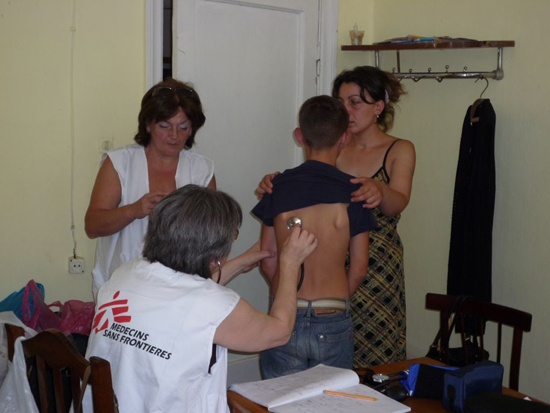In Tbilisi, MSF emergency teams are providing medical aid to those who have fled the fighting among Russians, Ossetians, and Georgians in South Ossetia. They are chiefly offering medical attention to people in shelters, some of them very elderly.

Georgia 2008 © Brigitte Breuillac/MSF
MSF medical staff examine a patient in Tbilisi.
In Tbilisi, Doctors Without Borders/Médecins Sans Frontières (MSF) emergency teams are providing medical aid to those who have fled the fighting among Russians, Ossetians, and Georgians in South Ossetia. They are chiefly offering medical attention to people in shelters, some of them very elderly.
Kalistine G. is having a hard time getting used to her new surroundings. This 82-year-old native of Georgia has been in Tbilisi for several days, where she has found refuge in an abandoned building that used to house the former Finance Ministry. She has re-joined four of her family members there, where they share a room that, in another era, was an office.
After intense fighting broke out August 7 in South Ossetia, she waited until the 17th to leave her village of Kourta, located on the outskirts Tskhinvali, the capital of this separatist province. There were only four women, each of them very elderly, remaining in a hamlet of this village, where the majority of the population is Georgian. As the days passed, their relatives and neighbors left the area.
Kalistine’s youngest daughter fled by car on August 8 to find refuge in Tbilisi. One of her daughter-in-laws left on the 12th—on foot. It took her two days to reach the city of Gori, a distance of 30 kilometers. But for Kalistine, walking was out of the question. She went to Gori by bus. “For three days I hid in a corn field,” Kalistine said. “Then one day I was sitting by the side of the road and I saw a bus coming.” So she reconciled herself to leaving.
Nearly 550 people are, like her, now living in these former buildings of the Georgian Finance Ministry. It took several days for aid to arrive; beds have since been brought in. An MSF team arrived on August 14. “There was dust everywhere, but some people found us a room to see patients,” said MSF’s Dr. Nana Chiochvili. “The first two days were really tough, but things are settling down now.” Neighborhood health clinics have sent in medical personnel and medicines.
The first group of patients MSF treated included “lightly injured cases,” said Dr. Chiochvili. “They had been hit by shrapnel, or had injured their feet, or had fallen as they fled.” MSF teams are still seeing patients at this site and at a number of other shelters for displaced persons in Tbilisi. They treated a total of 497 patients in Tbilisi over the period of August 14 to 22.
The needs are different now, Dr. Chiochvili said. “We are mainly seeing patients with chronic illnesses (hypertension, diabetes, epilepsy, etc.) who need to keep up their treatments; also patients who are suffering from insomnia, or exhaustion, or getting headaches, or have started to shake uncontrollably.” Fighting between the Russian and Georgian forces lasted only a few days, but these patients are overwhelmed with fear. A team of MSF psychologists is expected to be ready to go to work very shortly.
To meet the material needs of displaced people, MSF teams have distributed 582 hygiene kits, which include items such as soap, washing detergent, toothpaste, and drinking cups. For very young children the teams have supplied mothers with 113 kits with pillows and talcum powder. Other aid organizations are attempting to deal with the problem of water; some floors of the old Finance Ministry building have neither water or functioning toilets.



